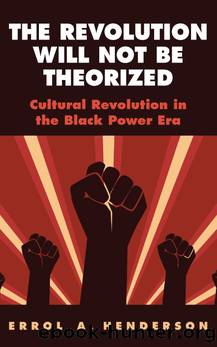The Revolution Will Not Be Theorized by Errol A. Henderson;

Author:Errol A. Henderson;
Language: eng
Format: epub
Publisher: State University of New York Press
Published: 2019-09-14T16:00:00+00:00
RAM’s Thesis on Cultural Revolution
Stanford notes that since publication of the organization’s internal document Orientation to a Black Mass Movement in 1962, RAM maintained that “the captive nation status of black America had bred a colonial mentality which must be wiped away through a cultural or social revolution” (Stanford, 1986, p. 154) whose purpose was “to destroy the conditioned white oppressive mores, attitudes, ways, customs, philosophies, habits, etc., which the oppressor has taught and trained us to have” and to replace them “on a mass scale” with “a new revolutionary culture” (ibid., p. 124). In 1964, RAM’s position was consistent with those articulated at the Fisk conference in Nashville, which viewed black cultural revolution in terms of “re-Africanization,” as a “repudiation of decadent materialist values and pathological egoism inherent in American society” and a concomitant embrace of “a humanism derived from the African heritage which exalts aesthetic, intellectual and spiritual development and communalism or cooperation rather than the exploitation of humanity” (Freeman, 1964, p. 18). They asserted that “Afro-Americans must know their authentic history in Africa and America in order to demolish the psychological rape of white American indoctrination.” Further, they maintained that “[t]he Afro-American self-image must be revolutionized to foster a sense of collective ethnic identity as a unique Black People before Black Nationalism can emerge triumphant” (ibid., p. 18). These conceptualizations seem consistent with Malcolm’s reverse civilizationism and all the theoretical and practical problems this foretold, but actually, under the simultaneous influence of Cruse, Moore, and Boggs, RAM did not conflate African American and African culture in a way that some later BPM revolutionists would (e.g., Us, the RNA, and initially CAP). While they consistently asserted the African origins of black American culture and history, they simultaneously argued the necessity of considering black American history, culture, politics, and economics on their own terms and in their unique American context. As a result, the process by which RAM’s proposed black cultural revolution was to take place was not identical to that presumed to obtain in the African or broader third world colonial context but would be tailored to the demands of the black colony in the United States. Unfortunately, RAM’s elucidation of the process of this revolution was not clear.
Stanford agrees that “the specifics of this cultural revolution were never adequately described,” yet, “generally it would involve the destruction of the slave mentality and those classes and institutions which supported it” (1986, p. 154). “The slave culture,” according to RAM, had created “a generation of ‘freaks’ who identified with a hip life style,” which “transcended all classes and acted as a release valve for the sense of powerlessness that black people experienced. This hip society destroyed the cultural identity of blacks and distorted the roles of men and women” (ibid.). Thus, “as part of the black cultural revolution,” RAM “worked with other groups to set up black cultural committees to spread ‘revolutionary black culture’ in the black community” (ibid., p. 125). By and large, RAM’s initiatives were aimed at
Download
This site does not store any files on its server. We only index and link to content provided by other sites. Please contact the content providers to delete copyright contents if any and email us, we'll remove relevant links or contents immediately.
| Africa | Americas |
| Arctic & Antarctica | Asia |
| Australia & Oceania | Europe |
| Middle East | Russia |
| United States | World |
| Ancient Civilizations | Military |
| Historical Study & Educational Resources |
The Bomber Mafia by Malcolm Gladwell(1183)
Submerged Prehistory by Benjamin Jonathan; & Clive Bonsall & Catriona Pickard & Anders Fischer(1162)
Facing the Mountain by Daniel James Brown(1135)
The Dawn of Everything by David Graeber & David Wengrow(1111)
The Way of Fire and Ice: The Living Tradition of Norse Paganism by Ryan Smith(1033)
Wandering in Strange Lands by Morgan Jerkins(1018)
Driving While Brown: Sheriff Joe Arpaio Versus the Latino Resistance by Terry Greene Sterling & Jude Joffe-Block(1003)
Tip Top by Bill James(1002)
Evil Geniuses: The Unmaking of America: A Recent History by Kurt Andersen(1001)
Red Roulette : An Insider's Story of Wealth, Power, Corruption, and Vengeance in Today's China (9781982156176) by Shum Desmond(1000)
F*cking History by The Captain(969)
It Was All a Lie by Stuart Stevens;(941)
White House Inc. by Dan Alexander(905)
Evil Geniuses by Kurt Andersen(903)
Treasure Islands: Tax Havens and the Men who Stole the World by Nicholas Shaxson(880)
American Dreams by Unknown(859)
American Kompromat by Craig Unger(848)
The Fifteen Biggest Lies about the Economy: And Everything Else the Right Doesn't Want You to Know about Taxes, Jobs, and Corporate America by Joshua Holland(816)
The First Conspiracy by Brad Meltzer & Josh Mensch(812)
